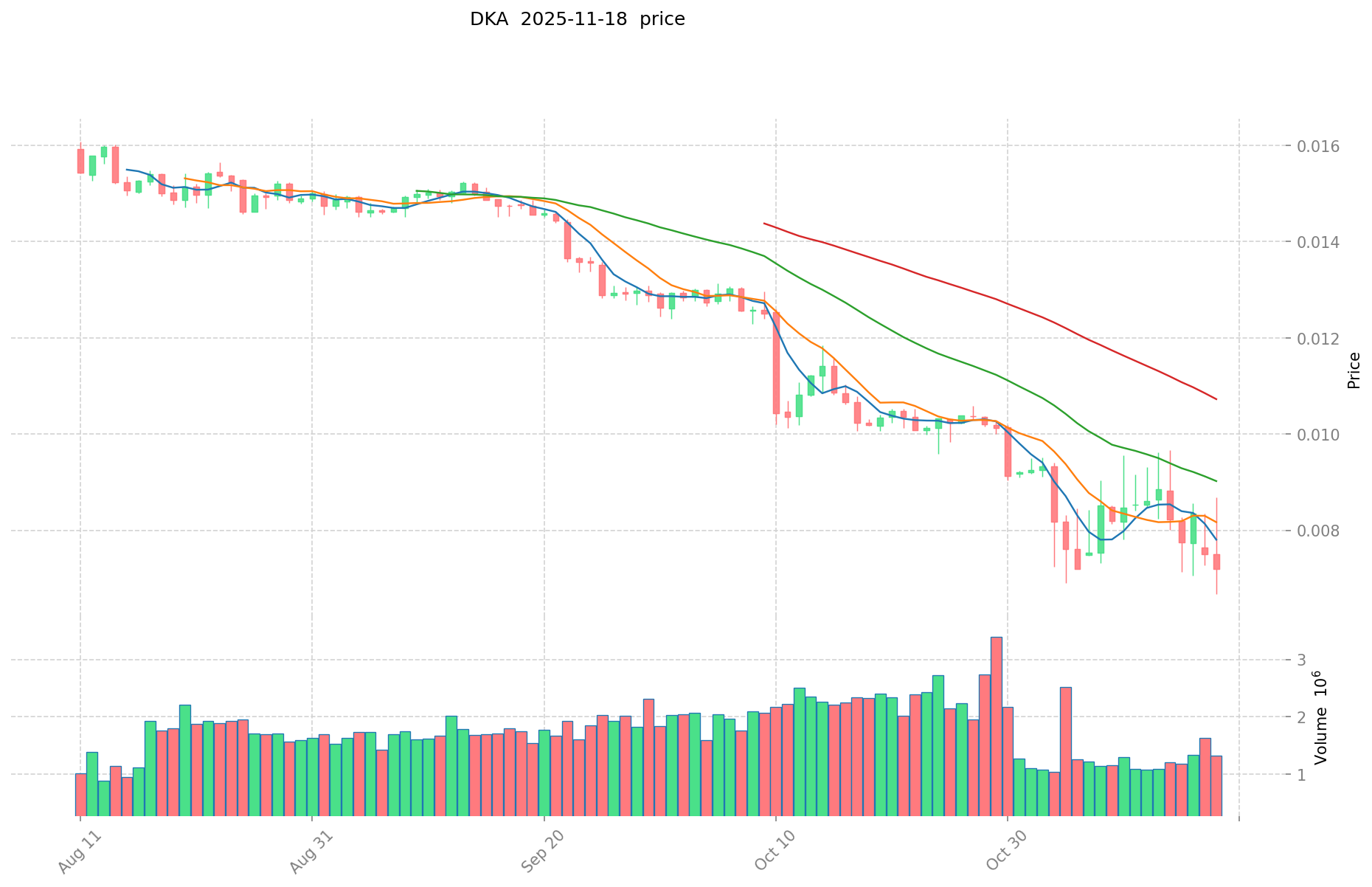What is DKA: Understanding Diabetic Ketoacidosis and Its Dangers
dKargo's Positioning and Significance
In 2020, dKargo (DKA) was introduced as a blockchain-based logistics protocol, aiming to solve the challenges hindering cooperation in the logistics industry.
As a pioneering blockchain solution for logistics, dKargo plays a crucial role in enhancing efficiency and trust within the supply chain and logistics sector.
As of 2025, dKargo has established itself as a significant player in the blockchain-powered logistics space, with a growing ecosystem of participants contributing to a more efficient logistics network.
Origin and Development History
Birth Background
dKargo was created to address the trust issues between scattered participants in the logistics industry. It emerged during a period of increasing blockchain adoption across various sectors, aiming to establish an efficient logistics network based on unprecedented cooperation.
The launch of dKargo brought new possibilities for logistics service providers, users, and recipients by leveraging blockchain technology.
Important Milestones
- 2020: Main network launch, introducing blockchain-based solutions to the logistics industry.
- 2021: DKA token reaches its all-time high of $0.703797 on March 16.
- 2025: Ecosystem expansion, with increasing adoption of dKargo's blockchain solutions in the logistics sector.
With support from its community and development team, dKargo continues to optimize its technology, security, and real-world applications in the logistics industry.
How Does dKargo Work?
Decentralized Control
dKargo operates on a decentralized network of computers (nodes) worldwide, eliminating the need for centralized control by traditional logistics intermediaries.
These nodes collaborate to validate transactions, ensuring system transparency and attack resistance, thus empowering users with greater autonomy and improving network resilience.
Blockchain Core
dKargo's blockchain serves as a public, immutable digital ledger recording every transaction within the logistics ecosystem.
Transactions are grouped into blocks and linked through cryptographic hashes, forming a secure chain.
Anyone can view the records, establishing trust without intermediaries.
Ensuring Fairness
dKargo likely employs a consensus mechanism to validate transactions and prevent fraudulent activities within the logistics network.
Participants contribute to network security through activities such as providing logistics services and uploading data, receiving DKA tokens as rewards.
Secure Transactions
dKargo uses public-private key encryption to secure transactions:
- Private keys (like secret passwords) are used to sign transactions
- Public keys (similar to account numbers) are used to verify ownership
This mechanism ensures the security of funds and maintains a level of privacy for transactions within the logistics ecosystem.
DKA's Market Performance
Circulation Overview
As of November 18, 2025, DKA's circulating supply is 5,000,000,000 tokens, which is equal to its total supply of 5,000,000,000.
Price Fluctuations
DKA reached its all-time high of $0.703797 on March 16, 2021. Its lowest price was $0.00699679, recorded on November 18, 2025. These fluctuations reflect market sentiment, adoption trends, and external factors.
Click to view the current market price of DKA

On-chain Metrics
- Daily Transaction Volume: $9,368.104029 (indicating network activity)
- Active Addresses: 4,424 (reflecting user engagement)
DKA Ecosystem Applications and Partnerships
Core Use Cases
DKA's ecosystem supports various applications:
- Logistics: dKargo, providing blockchain-based logistics solutions.
Strategic Partnerships
DKA has established partnerships to enhance its technological capabilities and market influence. These partnerships provide a solid foundation for DKA's ecosystem expansion.
Controversies and Challenges
DKA faces the following challenges:
- Market Volatility: Significant price fluctuations since its all-time high.
- Competitive Pressure: Competition from other blockchain-based logistics solutions.
These issues have sparked discussions within the community and market, driving continuous innovation for DKA.
DKA Community and Social Media Atmosphere
Fan Enthusiasm
DKA's community shows activity, with 4,424 holders as of the latest data. Price movements and project developments likely influence community engagement.
Social Media Sentiment
Social media sentiment may be mixed:
- Supporters might praise DKA's blockchain-based logistics solutions.
- Critics may focus on price volatility and market performance.
Recent trends show a bearish sentiment given the significant price decline from all-time highs.
Hot Topics
Users may discuss DKA's logistics applications, price performance, and future potential in the blockchain logistics sector.
More Information Sources for DKA
- Official Website: Visit dKargo's official website for features, use cases, and latest updates.
- Smart Contract: View the DKA token contract on Etherscan for blockchain details.
DKA Future Roadmap
- Ecosystem Goal: Expand blockchain-based logistics solutions
- Long-term Vision: Become a leading protocol in the blockchain logistics sector
How to Participate in DKA?
- Purchase Channels: Buy DKA on Gate.com
- Storage Solutions: Use secure wallets compatible with ERC-20 tokens
- Ecosystem Participation: Explore opportunities within the dKargo logistics platform
Summary
DKA, through blockchain technology, is redefining logistics solutions, offering transparency, security, and efficiency in supply chain management. Its active community and market presence make it notable in the cryptocurrency space. Despite facing challenges like market volatility, DKA's innovative approach to logistics positions it as a project to watch in the decentralized technology future. Whether you're new to crypto or an experienced player, DKA's role in blockchain-based logistics makes it worth following and participating in.
FAQ
What is the main cause of DKA?
The main cause of DKA is typically an underlying infection, disruption in insulin treatment, or new onset of diabetes. It occurs when the body breaks down fat for energy instead of glucose.
Is DKA life threatening?
Yes, DKA (Diabetic Ketoacidosis) can be life-threatening if not treated promptly. It's a serious complication of diabetes requiring immediate medical attention.
What blood sugar level is DKA?
DKA typically occurs when blood sugar levels exceed 250 mg/dL. Immediate medical attention is needed at this level.
How does a person go into DKA?
DKA occurs when insulin levels are very low, causing the body to burn fat for energy. This leads to ketone buildup in the blood, resulting in high blood sugar, frequent urination, and nausea.
Share
Content